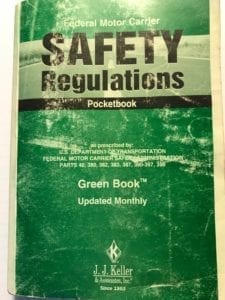Brian J Graber LLC is a truck driver whistleblower lawyer representing truck drivers who are retaliated against in violation of the STAA whistleblower law in Illinois, Indiana, and Michigan. The Surface Transportation Assistance Act (STAA) Whistleblower Protection Provisions, 49 U.S.C. §31105 protects truck drivers, including independent contractors, mechanics, freight handlers, intermodal drivers, and commercial bus drivers from retaliation for engaging in certain protected activities including but not limited to reporting violations of safety regulations and refusing to drive trucks or buses that are in violation of the safety regulations or are otherwise unsafe.
STAA PROTECTED ACTIVITY
Under the STAA, truck driver whistleblower law, 49 U.S.C. §31105(a)(1) a person may not discharge an employee, or discipline or discriminate against an employee regarding pay, terms, or privileges of employment because the employee engaged in any of the following protected activities:
- The employee, or another person at the employee’s request, has filed a complaint or begun a proceeding related to a violation of a commercial motor vehicle safety or security regulation, standard, or order, or has testified or will testify in such a proceeding.
- The person perceives that the employee has filed or is about to file a complaint or has begun or is about to begin a proceeding related to a violation of a commercial motor vehicle safety or security regulation, standard, or order.
- The employee refuses to operate a vehicle because the operation violates a regulation, standard, or order of the United States related to commercial motor vehicle safety, health, or security.
- The employee refuses to operate a vehicle because the employee has a reasonable apprehension of serious injury to the employee or the public because of the vehicle’s hazardous safety or security condition. An employee’s apprehension of serious injury is reasonable only if a reasonable individual in the circumstances then confronting the employee would conclude that the hazardous safety or security condition establishes a real danger of accident, injury, or serious impairment to health. To qualify for protection, the employee must have sought from the employer, and been unable to obtain, correction of the hazardous safety or security condition.
- The employee accurately reports hours on duty pursuant to 49 U.S.C. §31501, et seq.
- The employee cooperates, or the person perceives that the employee is about to cooperate, with a safety or security investigation, the Secretary of Transportation, Secretary of Homeland Security, or the National Transportation Safety Board.
- The employee furnishes, or the person perceives that the employee is or is about to furnish, information to the Secretary of Transportation, the Secretary of Homeland Security, the National Transportation Safety Board, or any Federal, State, or local regulatory or law enforcement agency as to facts relating to any accident or incident resulting in injury or death to an individual or damage to property occurring in connection with commercial motor vehicle transportation.
EMPLOYEE’S BURDEN OF PROOF
An employee suffering retaliation for his or her protected activity in violation of the STAA must generally prove that:
- The employee engaged in one or more the above described STAA protected activities;
- The employer/manager knew or suspected that the employee engaged in the STAA protected activities;
- The employee suffered retaliatory action (adverse action that would dissuade a reasonable employee from ending in the STAA protected activity); and
- The STAA protected activity was a “contributing factor” in the retaliatory action.
A “contributing factor” is a factor which, alone or with other factors, in any way affects the outcome of a decision. Each and every case is different and each case requires a detailed analysis by an experienced employment attorney. Several other factors alleged by the employer may require further analysis and could have an effect on the ultimate outcome of the potential litigation.
COMMON VIOLATIONS OF THE STAA WHISTLEBLOWER PROTECTION ACT
Employers commonly violate STAA, 49 U.S.C. §31105(a)(1)(A)(i) when they retaliate against a driver who conducts a pre-trip inspection report identifying that the assigned truck or bus is in violation of a Federal Motor Carrier Safety Regulation or has a hazardous condition and the employee is requesting that the violation or hazardous condition be corrected before he or she will drive the truck or bus. Usually, the employer violates the STAA, 49 U.S.C. §31105(b)(i) or (ii) after the employee has reported either a violation of the Federal Motor Carrier Safety Regulations or the employee has reported a hazardous condition he or she reasonably believes will result in a real danger of an accident on the pre-trip inspection report, has brought the regulatory violation or hazardous condition to management’s attention, has requested violation or hazardous condition be repaired, and management, thereafter, refuses and insists the employee drive the truck or bus in violation of Federal law.
Common violations of the Federal Motor Carrier Safety Regulations include the following:
- Requiring a driver to operate a motor vehicle in violation of 49 C.F.R. §392.3 while the driver’s ability or alertness is so impaired or likely to become impaired, through fatigue, illness, or any other cause, as to make it unsafe for him/her to begin or continue to operate a commercial motor vehicle. The STAA may provide truck drivers and commercial bus drivers with coronavirus anti-retaliation protections.
- Requiring a driver to operate a commercial motor vehicle between points in such a period of time as would require to drive at speeds greater than those prescribed by the jurisdictions in which the commercial motor vehicle will be operated to meet a deadline in violation of 49 C.F.R. §392.6.
- Requiring a driver to operate a commercial motor vehicle in violation of state or local laws such as weight limits in violation of 49 C.F.R. §392.2.
- Requiring a driver to operate a commercial motor vehicle that fails to meet the equipment requirements of 49 C.F.R. Part 393 for lamps, reflective devices, brakes, fuel systems, coupling devices, emergency equipment, shifting cargo, wheels, and steering which is a violation of 49 C.F.R. §393.1.
- Requiring drivers to operate in violation of the hazardous materials regulations in 49 C.F.R. Part C, is a violation of 49 C.F.R. §171.2(f).
- Requiring drivers to operate in violation of 49 C.F.R. Part 395 – Hours of Service.
- Requiring a driver to operate a commercial motor vehicle in a condition likely to cause an accident or breakdown in violation of 49 C.F.R. §396.7(a).
- Requiring a driver to operate a commercial motor vehicle without repairing any defect or deficiency listed on the driver inspection report which would be likely to affect the safety and operation of the motor vehicle in violation of 49 C.F.R. §396.11(a)(3).
- Requiring a driver to continue to operate when weather conditions become sufficiently dangerous in violation of 49 C.F.R. §392.14.
You can engage in protected activity for the purposes of the STAA by reporting your employer’s safety violations to the U.S. Department of Transportation, Federal Motor Carrier Safety Administration at 1-888-368-7238 between 8:00 a.m. to 8:00 p.m., EST, Monday through Friday or online at https://www.fmcsa.dot.gov . Prevent your employer from risking lives to make a profit by reporting those safety violations to the U.S. Department of Transportation.
THE STAA DEFINES THE TERM “EMPLOYEE” BROADLY TO PROVIDE EXPANSIVE WHISTLEBLOWER PROTECTIONS
The STAA, 49 U.S.C. §31105(j) defines the term “employee” broadly to include a driver of a commercial motor vehicle, including an independent contractor when personally operating a motor vehicle, a mechanic, a freight handler, or an individual not an employer who: (1) directly affects commercial motor vehicle safety or security in the course of employment by a commercial motor carrier; and (2) is not an employee of the United States Government, a State, or a political subdivision of a State acting in the course of employment.

The STAA Whistleblower Protection provisions apply to intermodal truck drivers, mechanics, and freight handlers.

The STAA Whistleblower Protection provisions apply to buses used on highways in commerce to transport passengers if the vehicle has a weight rating or gross vehicle weight rating of at least 10,001 pounds, whichever is greater; or is designed to transport more than 10 passengers, including the driver. The STAA’s Whistleblower Protection provisions do not extend the United States, the United States Postal Service, a State, or a political subdivision of a State.
STATUTE OF LIMITATIONS
The STAA, 49 U.S.C. §31105(b) requires that an employee claiming any retaliation in violation of the STAA Whistleblower Protections file a complaint with the U.S. Department of Labor/OSHA not later than 180 days after the alleged violation occurred. Failure to timely file a complaint with the U.S. Department of Labor/OSHA will likely bar you from making any claims for violations of your rights under the STAA Whistleblower Protection provisions. However, even if you are a covered employee under the STAA and you fail to timely file a complaint with the U.S. Department of Labor/OSHA within 180 days as required by 49 U.S.C. §31105(b), it is still worth your time to consult with Brian J Graber LLC, a truck driver whistleblower lawyer because you may still have claims under the Illinois Whistleblower Act and/or the Illinois common law tort of retaliatory discharge which have a much longer statute of limitations periods. If you believe that you were retaliated against in violation of the STAA Whistleblower Protection provisions, contact Brian J Graber LLC, a truck driver whistleblower lawyer at the Illinois office: (312) 291-4648 or the Indiana office: (219) 232-9011 or in Michigan at (269) 230-6054 for a free consultation.
FILING A COMPLAINT WITH OSHA AND 210 DAY “KICK-OUT” PROVISIONS
Any employee covered by the STAA’s Whistleblower Protection provisions must file a whistleblower complaint with OSHA not later than 180 days after the alleged violation occurred or else all claims for whistleblowing under the STAA will likely be forever barred. Brian J Graber LLC, a truck driver whistleblower lawyer prepares and files Whistleblower Complaints with OSHA for our clients who have retained our legal services. You should consult an experienced attorney on STAA truck driver whistleblower law because there are many considerations that go into properly preparing and timely filing a Whistleblower Complaint with OSHA. Contact Brian J Graber LLC, a truck driver whistleblower lawyer at the Illinois office: (312) 291-4648 or the Indiana office: (219) 232-9011 or in Michgian at (269) 230-6054 for a free consultation.
Once your Whistleblower Complaint has been timely filed with OSHA there is a 210-day kick-out provision that allows you the option of filing your STAA whistleblower claims in federal district court. Under 49 U.S.C. §31105(c), if OSHA does not issue a final decision on your Whistleblower Complaint within 210 days after your Whistleblower Complaint was filed with OSHA and if the delay is not due to any bad faith on your part, you have an option of filing a lawsuit against the responsible parties in federal court. If you decide to file a lawsuit in federal court, you will have a right to request a jury trial on all issues. If you decide to proceed administratively your claims under the STAA’s truck driver whistleblower law will likely be decided by an Administrative Law Judge without the right to a trial by jury.
Contact Brian J Graber LLC at the Illinois office: (312) 291-4648 or the Indiana office: (219) 232-9011, or in Michigan at (269) 230-6054, if you would like a free consultation on your rights under the STAA Whistleblower Protection provisions, or email us.

